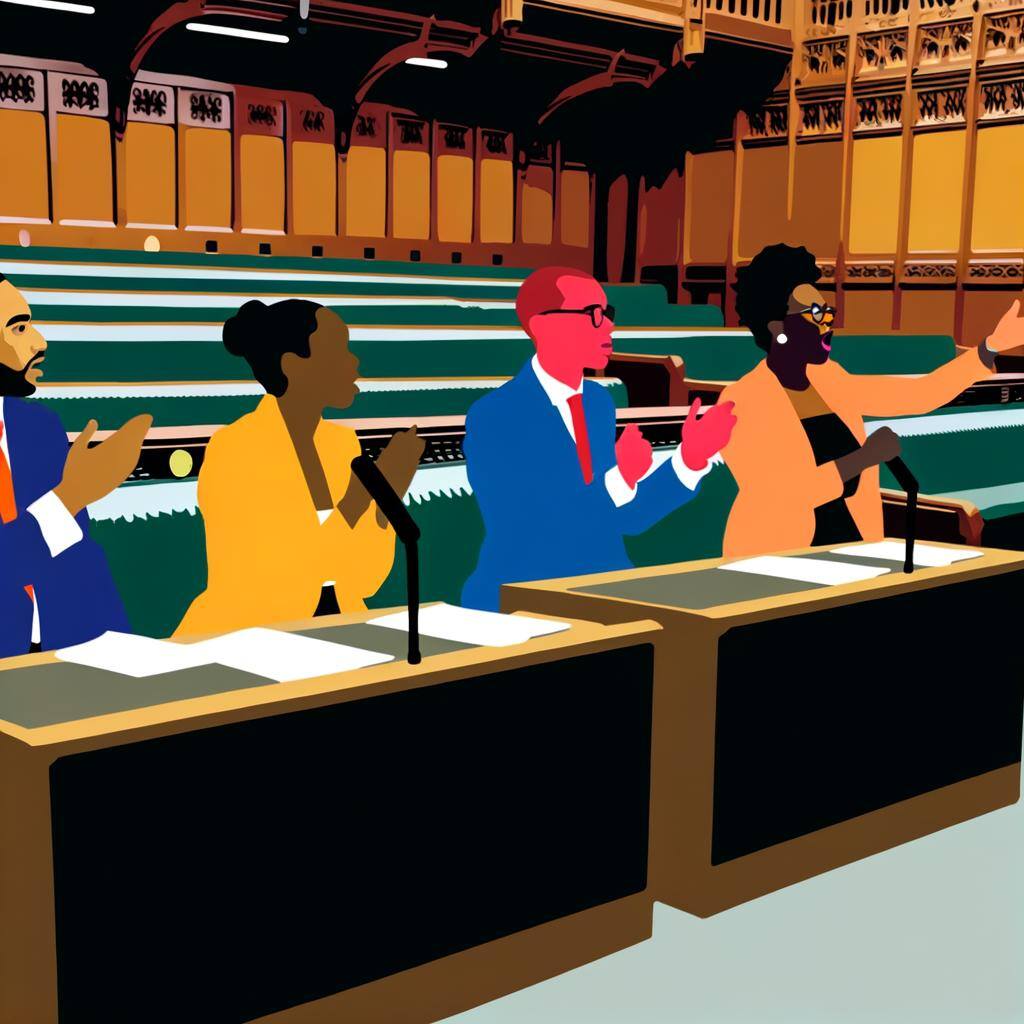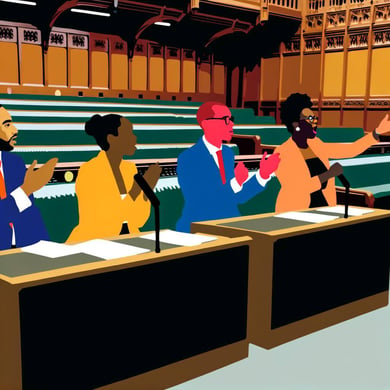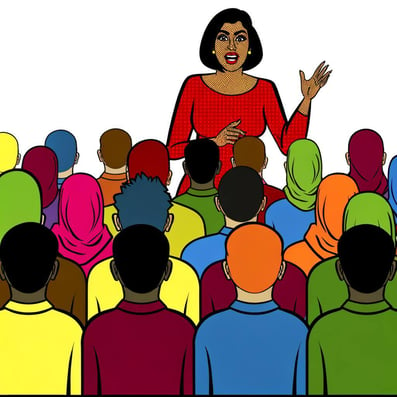Roles And Responsibilities: Understanding Positions In British Parliamentary Debate

Explore the distinct roles and responsibilities within a debate team, and how they contribute to the dynamics of a British Parliamentary Debate.
Overview of Debate Team Roles
In a British Parliamentary Debate, there are several key roles that define the structure and strategy of the debate. Each role has specific responsibilities and contributes to the overall dynamics of the team. Understanding these roles is essential for effective participation in a debate.
The debate team typically consists of two teams: the Government team and the Opposition team. Each team is further divided into three main roles: the Prime Minister, the Leader of the Opposition, and the Whips. These roles play a crucial part in presenting arguments, countering opposing arguments, and influencing the debate strategy.
The Prime Minister is responsible for introducing the motion and presenting the opening arguments for the Government team. They set the tone of the debate and outline the Government's stance on the issue. The Leader of the Opposition, on the other hand, presents the opening arguments for the Opposition team and challenges the arguments put forth by the Prime Minister. They play a critical role in countering the Government's position.
The Whips, both from the Government and Opposition teams, are responsible for assisting the Prime Minister and Leader of the Opposition respectively. They provide support, help with research, and ensure that the arguments presented are coherent and persuasive. The Whips also play a crucial role in influencing the debate strategy by providing feedback and suggestions to the speakers.
Understanding these roles and their responsibilities is essential for effective teamwork and coordination within the debate team. Each role contributes to the overall strategy of the team and plays a significant part in shaping the outcome of the debate.

Key Responsibilities of the Prime Minister and Leader of the Opposition
The Prime Minister and the Leader of the Opposition have distinct responsibilities within the debate team. The Prime Minister, as the leader of the Government team, is responsible for presenting the opening arguments and setting the agenda for the debate. They need to clearly articulate the Government's position on the motion and provide compelling arguments to support their stance.
The Leader of the Opposition, on the other hand, is responsible for challenging the arguments put forth by the Prime Minister. They need to present strong counter-arguments and provide an alternative perspective on the motion. The Leader of the Opposition plays a crucial role in highlighting any flaws or weaknesses in the Government's position.
Both the Prime Minister and the Leader of the Opposition need to demonstrate strong analytical and persuasive skills. They should be able to think critically, rebut opposing arguments effectively, and present their points in a clear and concise manner. Additionally, they need to be well-informed about the topic of debate and have a deep understanding of the relevant issues.
Overall, the key responsibilities of the Prime Minister and the Leader of the Opposition revolve around presenting strong arguments, countering opposing arguments, and effectively advocating for their respective positions.
Understanding the Deputy Prime Minister and Deputy Leader of the Opposition
In addition to the Prime Minister and the Leader of the Opposition, there are also Deputy roles within the debate team. The Deputy Prime Minister supports the Prime Minister in presenting arguments and assists in shaping the Government's strategy. They need to be well-versed in the motion and provide valuable insights and analysis.
Similarly, the Deputy Leader of the Opposition supports the Leader of the Opposition and provides assistance in countering the arguments put forth by the Government. They play a crucial role in strengthening the Opposition's position and ensuring a comprehensive response to the Government's arguments.
The Deputy roles require strong teamwork and coordination with the Prime Minister and the Leader of the Opposition. They need to effectively communicate and collaborate to ensure a cohesive and persuasive presentation of the team's arguments. The Deputies also have the responsibility of stepping in if the Prime Minister or the Leader of the Opposition is unable to continue during the debate.
Understanding the role of the Deputies is essential for maintaining continuity and ensuring that the team can adapt to any unforeseen circumstances during the debate.
How Member Speeches Work
Apart from the main roles of the Prime Minister, Leader of the Opposition, and the Deputies, there are also Member speeches in a British Parliamentary Debate. Members are responsible for providing additional arguments, elaborating on the team's position, and addressing specific points raised by the opposing team.
Member speeches focus on specific aspects of the debate and provide additional insights and analysis - this element of the speech is known as the extension. Members need to be well-prepared and have a deep understanding of the topic to effectively contribute to the team's arguments.
Member speeches play a crucial role in reinforcing the team's position, addressing any weaknesses or gaps in the arguments, and adding new perspectives to the debate. They provide an opportunity for the team to delve deeper into specific issues and counter the arguments put forth by the opposing team.
Overall, Member speeches contribute to the overall coherence and strength of the team's arguments, and enhance the team's strategy in the debate.

The Role of Whips in Influencing Debate Strategy
The Whips, both from the Government and Opposition teams, have an important role in influencing the debate strategy. They provide valuable feedback and suggestions to the speakers, ensuring that their arguments are coherent, persuasive, and aligned with the team's overall strategy.
Whips assist the Prime Minister and the Leader of the Opposition by conducting research, identifying potential weaknesses in the opposing team's arguments, and suggesting effective rebuttals. They play a critical role in preparing the speakers and ensuring that the team is well-prepared to counter the arguments put forth by the opposing team.
In addition to their support during the debate, the Whips also play a crucial role in the post-debate analysis. They provide feedback on the team's performance, identify areas for improvement, and help in honing the team's overall debating skills.
The role of the Whips is essential for maintaining a cohesive and effective debate strategy. Their insights and suggestions contribute to the overall success of the team in the debate.
Impact of Speaker Roles on Debate Outcomes
The different speaker roles in a British Parliamentary Debate have a significant impact on the overall outcome of the debate. Each role contributes to the team's overall strategy and influences the dynamics of the debate.
The Prime Minister sets the tone of the debate and presents the opening arguments. Their role is crucial in shaping the initial perception of the Government's position and establishing the framework for the debate. A strong and persuasive Prime Minister can effectively lay the groundwork for a successful debate.
The Leader of the Opposition plays a critical role in countering the Government's arguments and presenting an alternative perspective. Their ability to challenge the Government's position and provide strong counter-arguments can sway the opinions of the judges and the audience.
The Deputies support the Prime Minister and the Leader of the Opposition and ensure continuity in the team's arguments. Their role is important in maintaining the coherence of the team's position and addressing any weaknesses or gaps in the arguments.
The Member speeches provide additional insights and analysis, reinforcing the team's position and countering the arguments put forth by the opposing team. Their contribution adds depth and substance to the team's overall strategy.
Lastly, the Whips play a crucial role in influencing the debate strategy by providing feedback, suggestions, and assistance to the speakers. Their insights contribute to the overall effectiveness of the team's arguments and enhance the team's chances of success.
In conclusion, the different roles within a debate team have distinct responsibilities and contribute to the overall dynamics and strategy of a British Parliamentary Debate. Understanding these roles is essential for effective participation and success in debates.
